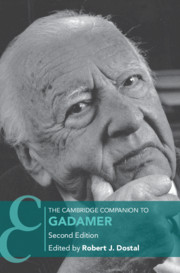Book contents
- The Cambridge Companion to Gadamer
- Other Volumes in the Series of Cambridge Companions
- The Cambridge Companion to Gadamer
- Copyright page
- Contents
- Contributors
- Abbreviations
- Introduction
- 1 Gadamer (1900–2002)
- 2 Gadamer’s Basic Understanding of Understanding
- 3 Getting It Right
- 4 Philosophical Hermeneutics, Language, and the Communicative Event
- 5 Phronesis and Solidarity
- 6 Gadamer’s Herderian Critics
- 7 Gadamer on the Human Sciences
- 8 Art Experience and Its Transformative Potential in Gadamer’s Hermeneutics
- 9 Lyric as Paradigm
- 10 Gadamer, the Hermeneutic Revolution, and Theology
- 11 Hermeneutics in Practice
- 12 Gadamer’s Hegel
- 13 Gadamer’s Relation to Heidegger and to Phenomenology
- 14 The Constellation of Hermeneutics, Critical Theory, and Deconstruction
- 15 Hermeneutics in a Broader Horizon
- Bibliography
- Index
- Other Volumes in the Series of Cambridge Companions (continued from page ii)
13 - Gadamer’s Relation to Heidegger and to Phenomenology
Published online by Cambridge University Press: 29 July 2021
- The Cambridge Companion to Gadamer
- Other Volumes in the Series of Cambridge Companions
- The Cambridge Companion to Gadamer
- Copyright page
- Contents
- Contributors
- Abbreviations
- Introduction
- 1 Gadamer (1900–2002)
- 2 Gadamer’s Basic Understanding of Understanding
- 3 Getting It Right
- 4 Philosophical Hermeneutics, Language, and the Communicative Event
- 5 Phronesis and Solidarity
- 6 Gadamer’s Herderian Critics
- 7 Gadamer on the Human Sciences
- 8 Art Experience and Its Transformative Potential in Gadamer’s Hermeneutics
- 9 Lyric as Paradigm
- 10 Gadamer, the Hermeneutic Revolution, and Theology
- 11 Hermeneutics in Practice
- 12 Gadamer’s Hegel
- 13 Gadamer’s Relation to Heidegger and to Phenomenology
- 14 The Constellation of Hermeneutics, Critical Theory, and Deconstruction
- 15 Hermeneutics in a Broader Horizon
- Bibliography
- Index
- Other Volumes in the Series of Cambridge Companions (continued from page ii)
Summary
This chapter explores the historical relationship between Heidegger and Gadamer. It points out several surprises and disappointments that Gadamer experienced with Heidegger. More importantly, the chapter considers the phenomenological character of Gadamer’s philosophical hermeneutics. Gadamer rejects many of the basic characteristics of Husserl’s phenomenology, but he is also indebted deeply to other aspects of Husserl’s phenomenology. These aspects he also shares with Heidegger–the concepts of horizon and lifeworld, the account of temporality, and the rejection of a representational epistemology. The chapter points out the distinctiveness of Gadamer’s philosophical hermeneutics in relation to Heidegger’s. Gadamer’s hermeneutics is more dialogical, embraces the antinomy of beginnings, and embraces Plato and Aristotle.
- Type
- Chapter
- Information
- The Cambridge Companion to Gadamer , pp. 334 - 354Publisher: Cambridge University PressPrint publication year: 2021
- 1
- Cited by

